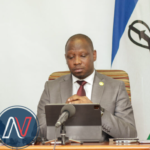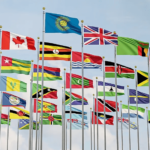As historical land injustices ignite regional reckoning, Lesotho’s leaders cling to timid diplomacy and betray their nation’s best hope.
Nkoane Sekhofa
In the high-stakes arena of international diplomacy, timing is everything. So is courage. Lesotho’s government, tragically, appears to possess neither.
Foreign Minister Lejone Mpotjoana’s recent dismissal of Dr. Ts’epoLipholo’s petition to the United Nations, a bold move to reclaim territories stripped from Lesotho during colonial conquests, is more than bureaucratic nitpicking. It is a damning indictment of a government paralysed by cowardice, ignorance, and a stunning lack of vision.
While South Africa grapples with its own explosive debates over land expropriation and reparative justice, Lesotho’s leaders are fumbling a rare historical moment: a chance to demand accountability for centuries of dispossession, backed by global allies and moral urgency. Instead, they’ve chosen to hide behind the threadbare cloak of “diplomatic process.”
Let’s be clear: this is not prudence. It is surrender.
The so-called “conquered territories” dispute a legacy of 19th-century British colonialism that saw nearly half of Lesotho’s land annexed to South Africa has simmered for generations. Ea lla koto ea khutla Naha made Ntsu Mokhehle and his band martyrs in some minds. Successive Basotho governments have tiptoed around the issue, wary of antagonising their powerful neighbour.
But Dr. Lipholo’s UN petition, though unauthorised by Qhobosheaneng, has ripped off the lid. It comes at a tectonic moment: South Africa’s ruling ANC, desperate to shore up its fading legitimacy, is advancing radical land reform policies to address apartheid-era thefts. Global movements for reparations, from the Caribbean to Namibia, are gaining traction. Even the UN’s own mechanisms for decolonisation and indigenous rights have never been more accessible.
Yet as the world leans into reckoning with historical crimes, Lesotho’s government has chosen to lean away. Mpotjoane’s feeble critique that Lipholo “lacked government permission” and “did not represent official policy” reveals a government allergic to its own people’s aspirations. Worse, it exposes a foreign minister utterly out of his depth.
This timidity is unsurprising. Prime Minister Sam Matekane’s administration, elected on a “rebound ticket” against corruption and incompetence, has always been more technocratic than transformative.
But governance requires more than spreadsheet diplomacy. Mpotjoane’s insistence on “measured dialogue” with Pretoria is a farce when South Africa itself is in upheaval over land. Does he truly believe that a nation dismantling statues of Cecil Rhodes will dismiss Lesotho’s claims out of hand? Or that the ANC, desperate for pan-African credibility, would risk being seen as a colonial apologist?
This is not 1976 or even 1985. The geopolitical winds have shifted. Yet Lesotho’s cabinet, clinging to archaic notions of bilateral decorum, seems oblivious. Their reluctance to seize this moment isn’t just naïve it’s a dereliction of duty.
History favours the bold. Imagine, for a moment, if Lesotho’s government embraced Lipholo’s momentum. By rallying regional allies, leveraging South Africa’s internal reforms, and invoking UN resolutions on territorial integrity, Maseru could position itself as a moral claimant in a continent still scarred by colonialism. Instead, Mpotjoane et al. have chosen to police their citizens rather than empower them.
The implications are dire. By sidelining Lipholo, Lesotho risks alienating a public hungry for justice. It squanders an opportunity to align with global reparative movements. And it signals to Pretoria, and the world, that Maseru lacks the spine to fight for its own sovereignty.
To the Lesotho government: This is not your mandate to squander. The conquered territories are not a bureaucratic footnote, they are a national trauma. Your people have waited 150 years for justice. They will not wait for another 150 while you draft another toothless memo.
The world is watching. South Africa is vulnerable. The iron is hot. Strike it, or step aside for those who will.
In the words of South Africa’s own liberation mantra: “Matla ke a rona.” Power belongs to those who seize it. Lesotho’s leaders, it seems, would rather beg for crumbs than claim their rightful feast.

Your Trusted Source for News and Insights in Lesotho!
At Newsday Media, we are passionate about delivering accurate, timely, and engaging news and multimedia content to our diverse audience. Founded with the vision of revolutionizing the media landscape in Lesotho, we have grown into a leading hybrid media company that blends traditional journalism with innovative digital platforms.










